Evaluating Health and Social Care Practices in Great Britain
VerifiedAdded on 2024/05/17
|19
|5513
|415
Report
AI Summary
This report provides a comprehensive overview of health and social care practices in Great Britain. It delves into the values and principles underpinning the field, emphasizing the importance of these tenets in ensuring proper care for service users. The report analyzes the procedures adopted in care homes to protect clients and colleagues from harm, including measures to prevent abuse and neglect. It explains the implementation of relevant policies, legislation, regulations, and codes of practice, evaluating their impact on organizational policy and practice. Furthermore, the report explores essential principles of support, such as respect, rights, privacy, and independence, and discusses theories related to health and social care practices, including Erikson's stages of human development. The impact of social processes on service users and the importance of inter-professional working are also examined. The report highlights common healthcare issues and proposes solutions, offering a detailed insight into the health and social care landscape in Great Britain.
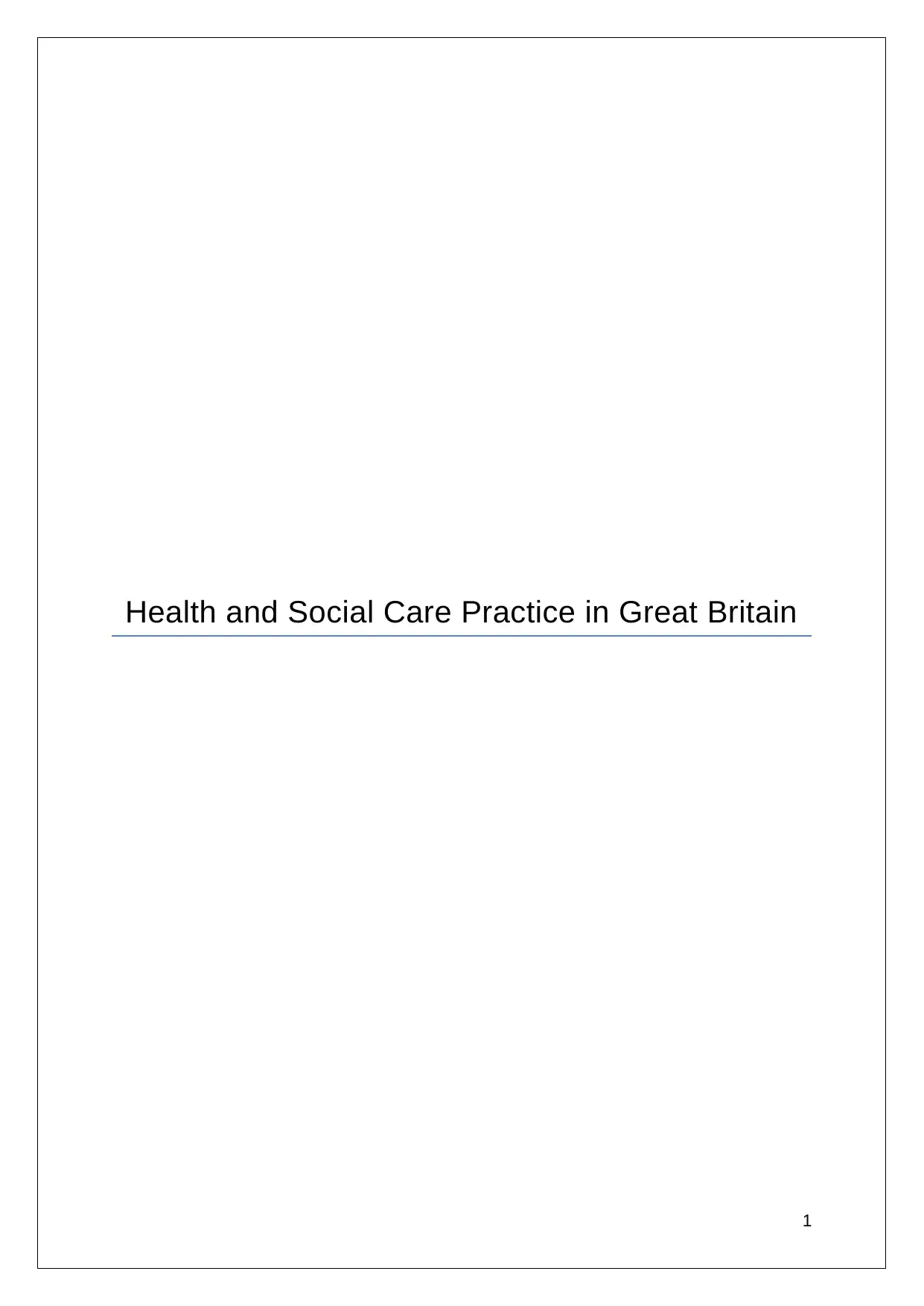
Health and Social Care Practice in Great Britain
1
1
Paraphrase This Document
Need a fresh take? Get an instant paraphrase of this document with our AI Paraphraser

Table of Contents
Introduction............................................................................................................................ 3
Task 1.................................................................................................................................... 4
Task 2.................................................................................................................................... 9
Task 3.................................................................................................................................. 13
Conclusion........................................................................................................................... 17
Reference List...................................................................................................................... 18
2
Introduction............................................................................................................................ 3
Task 1.................................................................................................................................... 4
Task 2.................................................................................................................................... 9
Task 3.................................................................................................................................. 13
Conclusion........................................................................................................................... 17
Reference List...................................................................................................................... 18
2
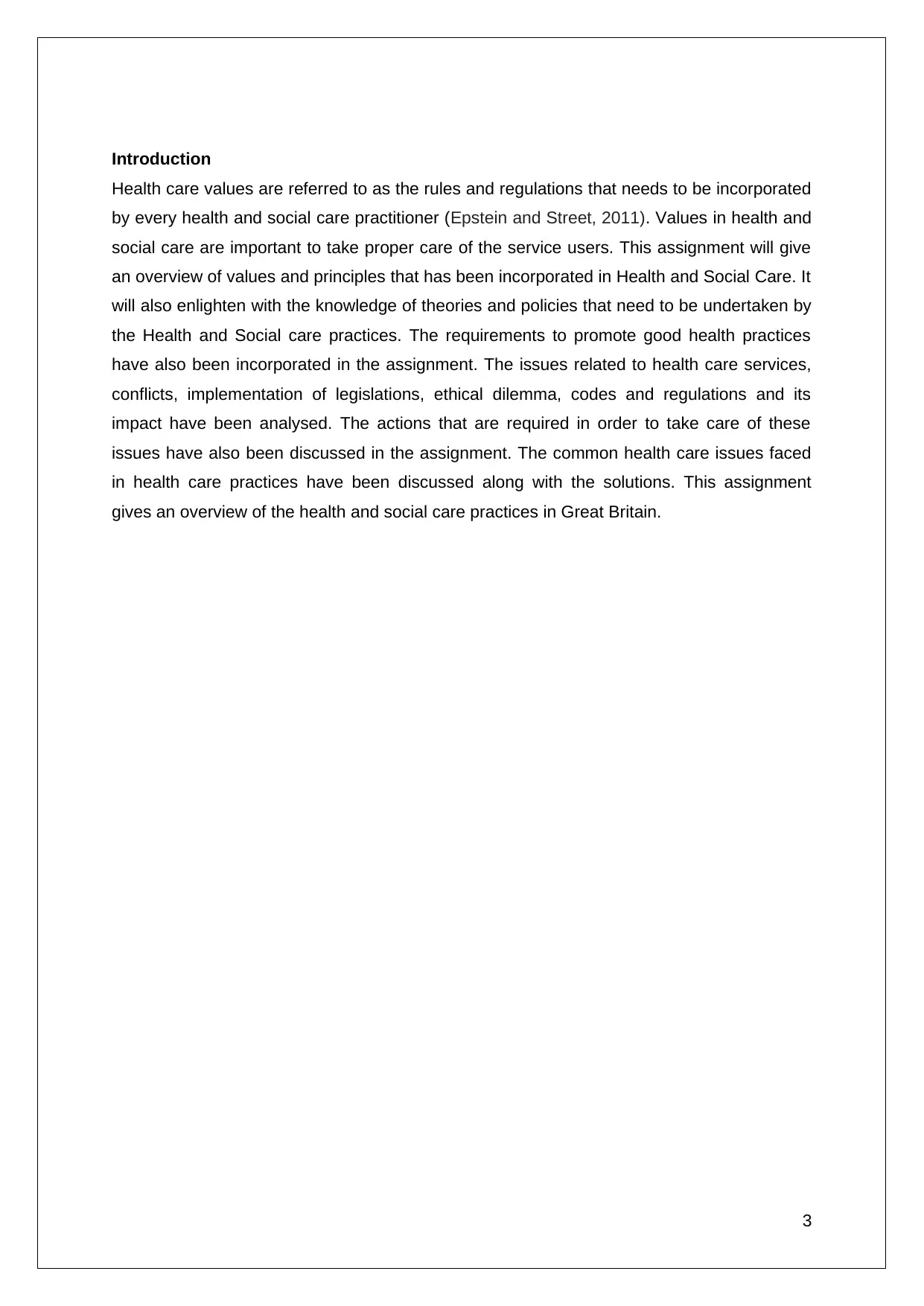
Introduction
Health care values are referred to as the rules and regulations that needs to be incorporated
by every health and social care practitioner (Epstein and Street, 2011). Values in health and
social care are important to take proper care of the service users. This assignment will give
an overview of values and principles that has been incorporated in Health and Social Care. It
will also enlighten with the knowledge of theories and policies that need to be undertaken by
the Health and Social care practices. The requirements to promote good health practices
have also been incorporated in the assignment. The issues related to health care services,
conflicts, implementation of legislations, ethical dilemma, codes and regulations and its
impact have been analysed. The actions that are required in order to take care of these
issues have also been discussed in the assignment. The common health care issues faced
in health care practices have been discussed along with the solutions. This assignment
gives an overview of the health and social care practices in Great Britain.
3
Health care values are referred to as the rules and regulations that needs to be incorporated
by every health and social care practitioner (Epstein and Street, 2011). Values in health and
social care are important to take proper care of the service users. This assignment will give
an overview of values and principles that has been incorporated in Health and Social Care. It
will also enlighten with the knowledge of theories and policies that need to be undertaken by
the Health and Social care practices. The requirements to promote good health practices
have also been incorporated in the assignment. The issues related to health care services,
conflicts, implementation of legislations, ethical dilemma, codes and regulations and its
impact have been analysed. The actions that are required in order to take care of these
issues have also been discussed in the assignment. The common health care issues faced
in health care practices have been discussed along with the solutions. This assignment
gives an overview of the health and social care practices in Great Britain.
3
⊘ This is a preview!⊘
Do you want full access?
Subscribe today to unlock all pages.

Trusted by 1+ million students worldwide
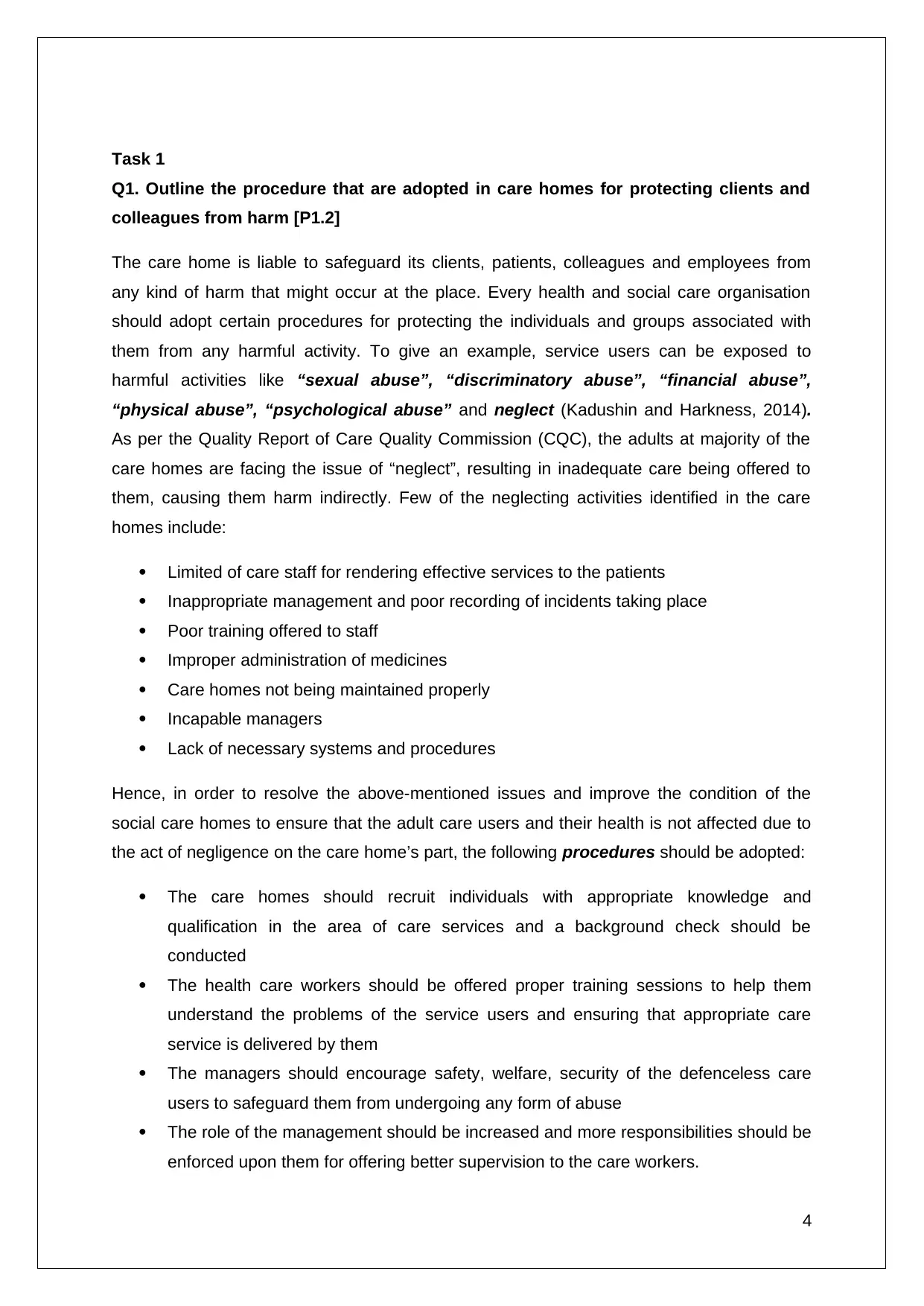
Task 1
Q1. Outline the procedure that are adopted in care homes for protecting clients and
colleagues from harm [P1.2]
The care home is liable to safeguard its clients, patients, colleagues and employees from
any kind of harm that might occur at the place. Every health and social care organisation
should adopt certain procedures for protecting the individuals and groups associated with
them from any harmful activity. To give an example, service users can be exposed to
harmful activities like “sexual abuse”, “discriminatory abuse”, “financial abuse”,
“physical abuse”, “psychological abuse” and neglect (Kadushin and Harkness, 2014).
As per the Quality Report of Care Quality Commission (CQC), the adults at majority of the
care homes are facing the issue of “neglect”, resulting in inadequate care being offered to
them, causing them harm indirectly. Few of the neglecting activities identified in the care
homes include:
Limited of care staff for rendering effective services to the patients
Inappropriate management and poor recording of incidents taking place
Poor training offered to staff
Improper administration of medicines
Care homes not being maintained properly
Incapable managers
Lack of necessary systems and procedures
Hence, in order to resolve the above-mentioned issues and improve the condition of the
social care homes to ensure that the adult care users and their health is not affected due to
the act of negligence on the care home’s part, the following procedures should be adopted:
The care homes should recruit individuals with appropriate knowledge and
qualification in the area of care services and a background check should be
conducted
The health care workers should be offered proper training sessions to help them
understand the problems of the service users and ensuring that appropriate care
service is delivered by them
The managers should encourage safety, welfare, security of the defenceless care
users to safeguard them from undergoing any form of abuse
The role of the management should be increased and more responsibilities should be
enforced upon them for offering better supervision to the care workers.
4
Q1. Outline the procedure that are adopted in care homes for protecting clients and
colleagues from harm [P1.2]
The care home is liable to safeguard its clients, patients, colleagues and employees from
any kind of harm that might occur at the place. Every health and social care organisation
should adopt certain procedures for protecting the individuals and groups associated with
them from any harmful activity. To give an example, service users can be exposed to
harmful activities like “sexual abuse”, “discriminatory abuse”, “financial abuse”,
“physical abuse”, “psychological abuse” and neglect (Kadushin and Harkness, 2014).
As per the Quality Report of Care Quality Commission (CQC), the adults at majority of the
care homes are facing the issue of “neglect”, resulting in inadequate care being offered to
them, causing them harm indirectly. Few of the neglecting activities identified in the care
homes include:
Limited of care staff for rendering effective services to the patients
Inappropriate management and poor recording of incidents taking place
Poor training offered to staff
Improper administration of medicines
Care homes not being maintained properly
Incapable managers
Lack of necessary systems and procedures
Hence, in order to resolve the above-mentioned issues and improve the condition of the
social care homes to ensure that the adult care users and their health is not affected due to
the act of negligence on the care home’s part, the following procedures should be adopted:
The care homes should recruit individuals with appropriate knowledge and
qualification in the area of care services and a background check should be
conducted
The health care workers should be offered proper training sessions to help them
understand the problems of the service users and ensuring that appropriate care
service is delivered by them
The managers should encourage safety, welfare, security of the defenceless care
users to safeguard them from undergoing any form of abuse
The role of the management should be increased and more responsibilities should be
enforced upon them for offering better supervision to the care workers.
4
Paraphrase This Document
Need a fresh take? Get an instant paraphrase of this document with our AI Paraphraser
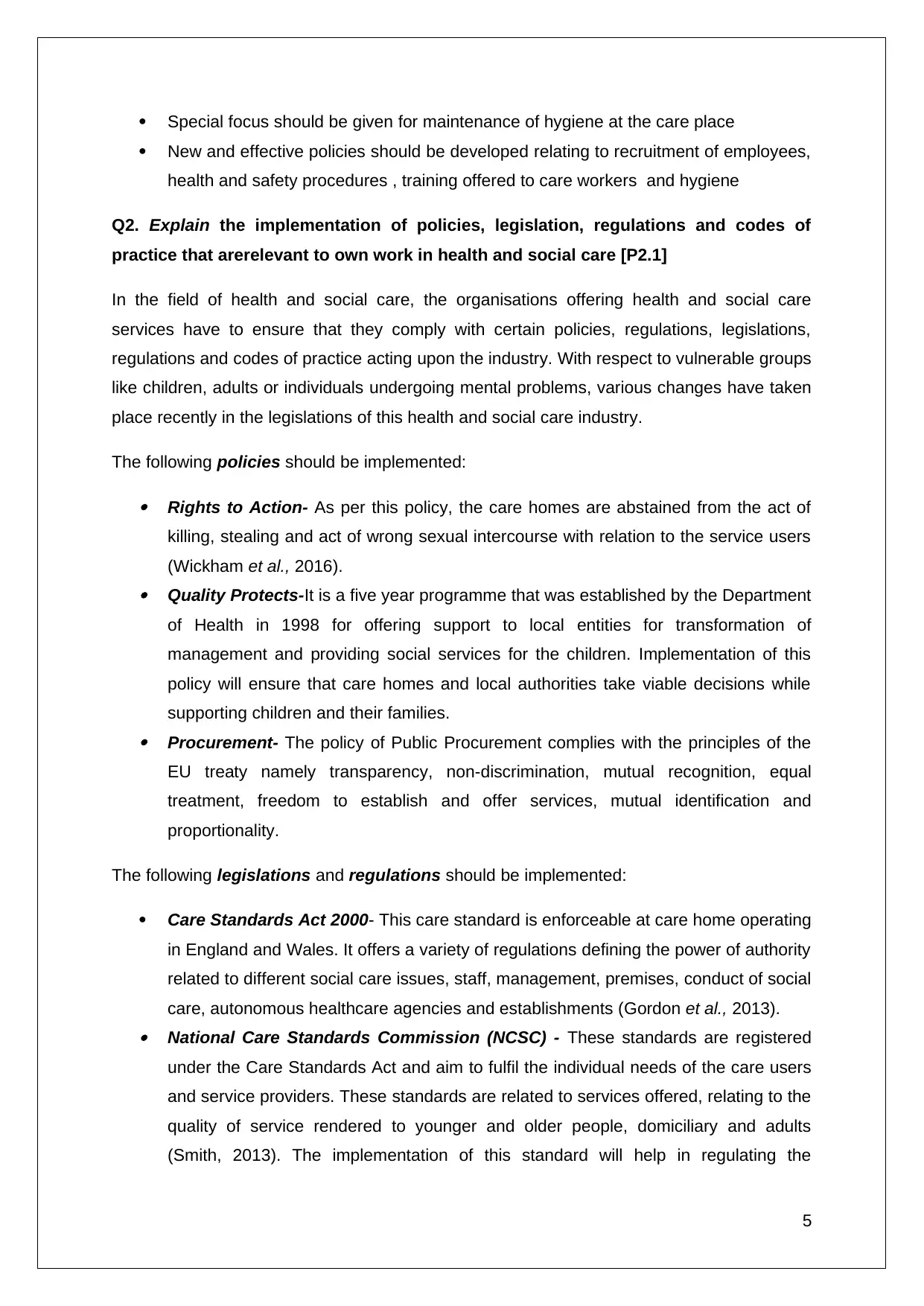
Special focus should be given for maintenance of hygiene at the care place
New and effective policies should be developed relating to recruitment of employees,
health and safety procedures , training offered to care workers and hygiene
Q2. Explain the implementation of policies, legislation, regulations and codes of
practice that arerelevant to own work in health and social care [P2.1]
In the field of health and social care, the organisations offering health and social care
services have to ensure that they comply with certain policies, regulations, legislations,
regulations and codes of practice acting upon the industry. With respect to vulnerable groups
like children, adults or individuals undergoing mental problems, various changes have taken
place recently in the legislations of this health and social care industry.
The following policies should be implemented: Rights to Action- As per this policy, the care homes are abstained from the act of
killing, stealing and act of wrong sexual intercourse with relation to the service users
(Wickham et al., 2016). Quality Protects-It is a five year programme that was established by the Department
of Health in 1998 for offering support to local entities for transformation of
management and providing social services for the children. Implementation of this
policy will ensure that care homes and local authorities take viable decisions while
supporting children and their families. Procurement- The policy of Public Procurement complies with the principles of the
EU treaty namely transparency, non-discrimination, mutual recognition, equal
treatment, freedom to establish and offer services, mutual identification and
proportionality.
The following legislations and regulations should be implemented:
Care Standards Act 2000- This care standard is enforceable at care home operating
in England and Wales. It offers a variety of regulations defining the power of authority
related to different social care issues, staff, management, premises, conduct of social
care, autonomous healthcare agencies and establishments (Gordon et al., 2013). National Care Standards Commission (NCSC) - These standards are registered
under the Care Standards Act and aim to fulfil the individual needs of the care users
and service providers. These standards are related to services offered, relating to the
quality of service rendered to younger and older people, domiciliary and adults
(Smith, 2013). The implementation of this standard will help in regulating the
5
New and effective policies should be developed relating to recruitment of employees,
health and safety procedures , training offered to care workers and hygiene
Q2. Explain the implementation of policies, legislation, regulations and codes of
practice that arerelevant to own work in health and social care [P2.1]
In the field of health and social care, the organisations offering health and social care
services have to ensure that they comply with certain policies, regulations, legislations,
regulations and codes of practice acting upon the industry. With respect to vulnerable groups
like children, adults or individuals undergoing mental problems, various changes have taken
place recently in the legislations of this health and social care industry.
The following policies should be implemented: Rights to Action- As per this policy, the care homes are abstained from the act of
killing, stealing and act of wrong sexual intercourse with relation to the service users
(Wickham et al., 2016). Quality Protects-It is a five year programme that was established by the Department
of Health in 1998 for offering support to local entities for transformation of
management and providing social services for the children. Implementation of this
policy will ensure that care homes and local authorities take viable decisions while
supporting children and their families. Procurement- The policy of Public Procurement complies with the principles of the
EU treaty namely transparency, non-discrimination, mutual recognition, equal
treatment, freedom to establish and offer services, mutual identification and
proportionality.
The following legislations and regulations should be implemented:
Care Standards Act 2000- This care standard is enforceable at care home operating
in England and Wales. It offers a variety of regulations defining the power of authority
related to different social care issues, staff, management, premises, conduct of social
care, autonomous healthcare agencies and establishments (Gordon et al., 2013). National Care Standards Commission (NCSC) - These standards are registered
under the Care Standards Act and aim to fulfil the individual needs of the care users
and service providers. These standards are related to services offered, relating to the
quality of service rendered to younger and older people, domiciliary and adults
(Smith, 2013). The implementation of this standard will help in regulating the
5
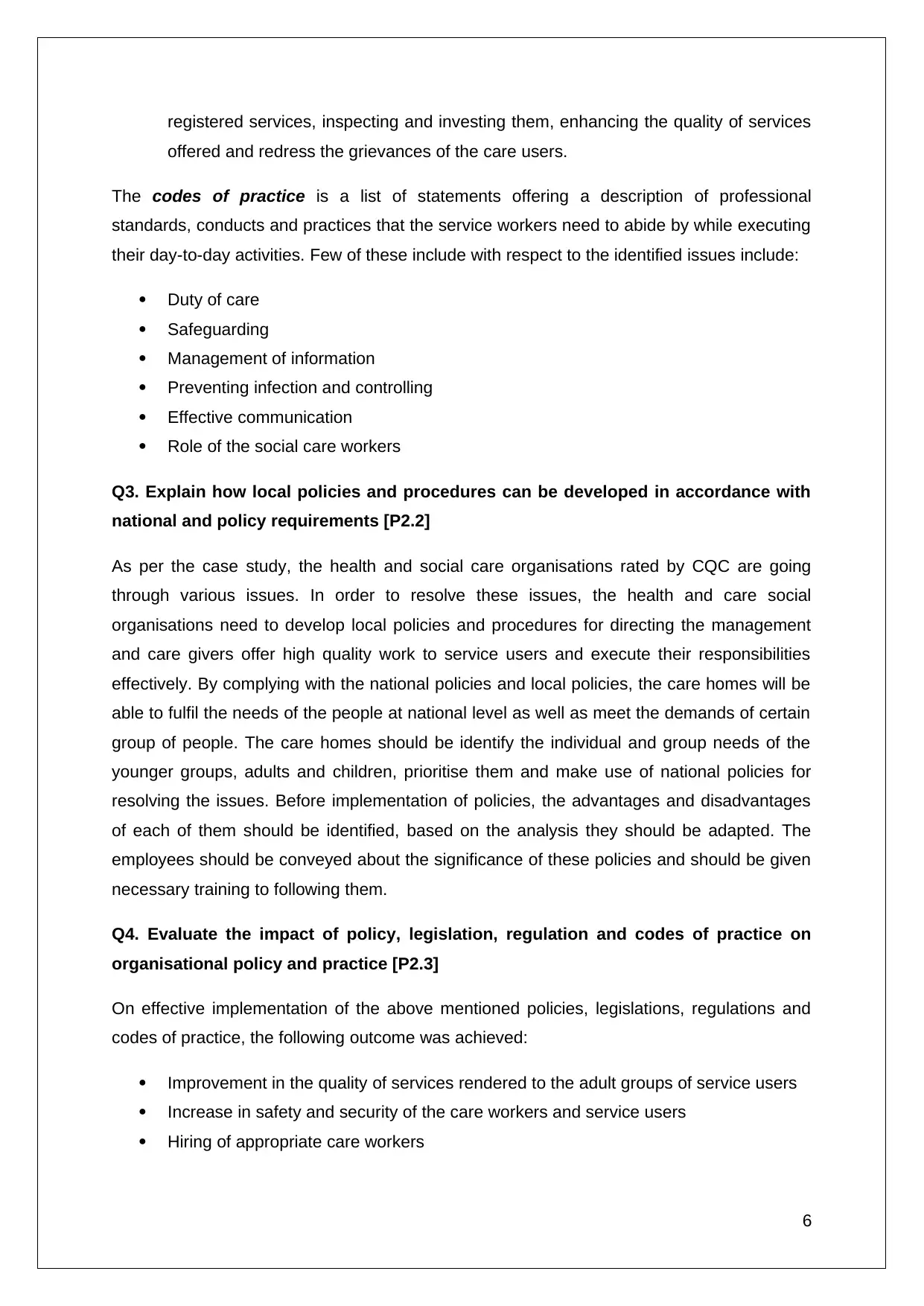
registered services, inspecting and investing them, enhancing the quality of services
offered and redress the grievances of the care users.
The codes of practice is a list of statements offering a description of professional
standards, conducts and practices that the service workers need to abide by while executing
their day-to-day activities. Few of these include with respect to the identified issues include:
Duty of care
Safeguarding
Management of information
Preventing infection and controlling
Effective communication
Role of the social care workers
Q3. Explain how local policies and procedures can be developed in accordance with
national and policy requirements [P2.2]
As per the case study, the health and social care organisations rated by CQC are going
through various issues. In order to resolve these issues, the health and care social
organisations need to develop local policies and procedures for directing the management
and care givers offer high quality work to service users and execute their responsibilities
effectively. By complying with the national policies and local policies, the care homes will be
able to fulfil the needs of the people at national level as well as meet the demands of certain
group of people. The care homes should be identify the individual and group needs of the
younger groups, adults and children, prioritise them and make use of national policies for
resolving the issues. Before implementation of policies, the advantages and disadvantages
of each of them should be identified, based on the analysis they should be adapted. The
employees should be conveyed about the significance of these policies and should be given
necessary training to following them.
Q4. Evaluate the impact of policy, legislation, regulation and codes of practice on
organisational policy and practice [P2.3]
On effective implementation of the above mentioned policies, legislations, regulations and
codes of practice, the following outcome was achieved:
Improvement in the quality of services rendered to the adult groups of service users
Increase in safety and security of the care workers and service users
Hiring of appropriate care workers
6
offered and redress the grievances of the care users.
The codes of practice is a list of statements offering a description of professional
standards, conducts and practices that the service workers need to abide by while executing
their day-to-day activities. Few of these include with respect to the identified issues include:
Duty of care
Safeguarding
Management of information
Preventing infection and controlling
Effective communication
Role of the social care workers
Q3. Explain how local policies and procedures can be developed in accordance with
national and policy requirements [P2.2]
As per the case study, the health and social care organisations rated by CQC are going
through various issues. In order to resolve these issues, the health and care social
organisations need to develop local policies and procedures for directing the management
and care givers offer high quality work to service users and execute their responsibilities
effectively. By complying with the national policies and local policies, the care homes will be
able to fulfil the needs of the people at national level as well as meet the demands of certain
group of people. The care homes should be identify the individual and group needs of the
younger groups, adults and children, prioritise them and make use of national policies for
resolving the issues. Before implementation of policies, the advantages and disadvantages
of each of them should be identified, based on the analysis they should be adapted. The
employees should be conveyed about the significance of these policies and should be given
necessary training to following them.
Q4. Evaluate the impact of policy, legislation, regulation and codes of practice on
organisational policy and practice [P2.3]
On effective implementation of the above mentioned policies, legislations, regulations and
codes of practice, the following outcome was achieved:
Improvement in the quality of services rendered to the adult groups of service users
Increase in safety and security of the care workers and service users
Hiring of appropriate care workers
6
⊘ This is a preview!⊘
Do you want full access?
Subscribe today to unlock all pages.

Trusted by 1+ million students worldwide
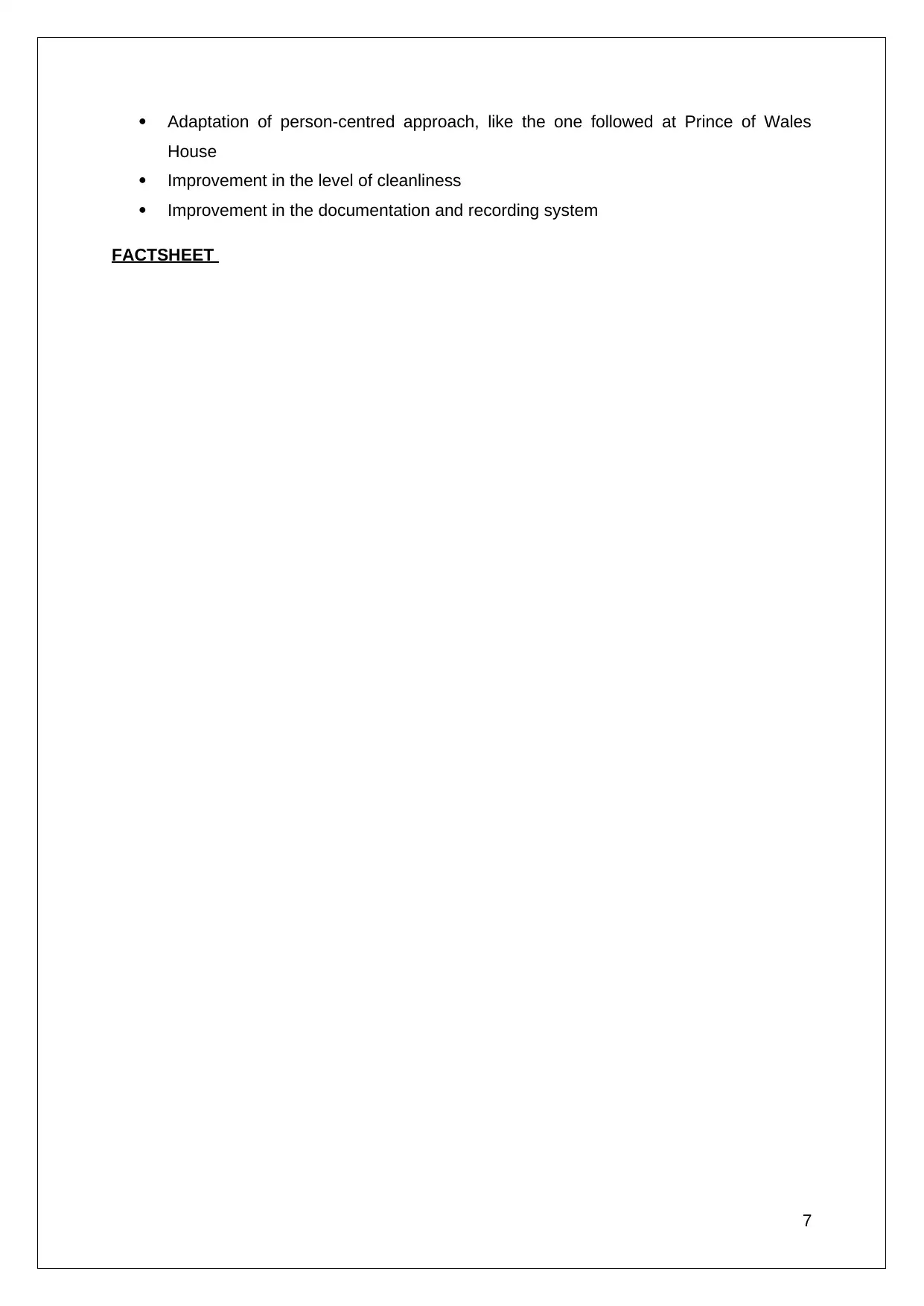
Adaptation of person-centred approach, like the one followed at Prince of Wales
House
Improvement in the level of cleanliness
Improvement in the documentation and recording system
FACTSHEET
7
House
Improvement in the level of cleanliness
Improvement in the documentation and recording system
FACTSHEET
7
Paraphrase This Document
Need a fresh take? Get an instant paraphrase of this document with our AI Paraphraser
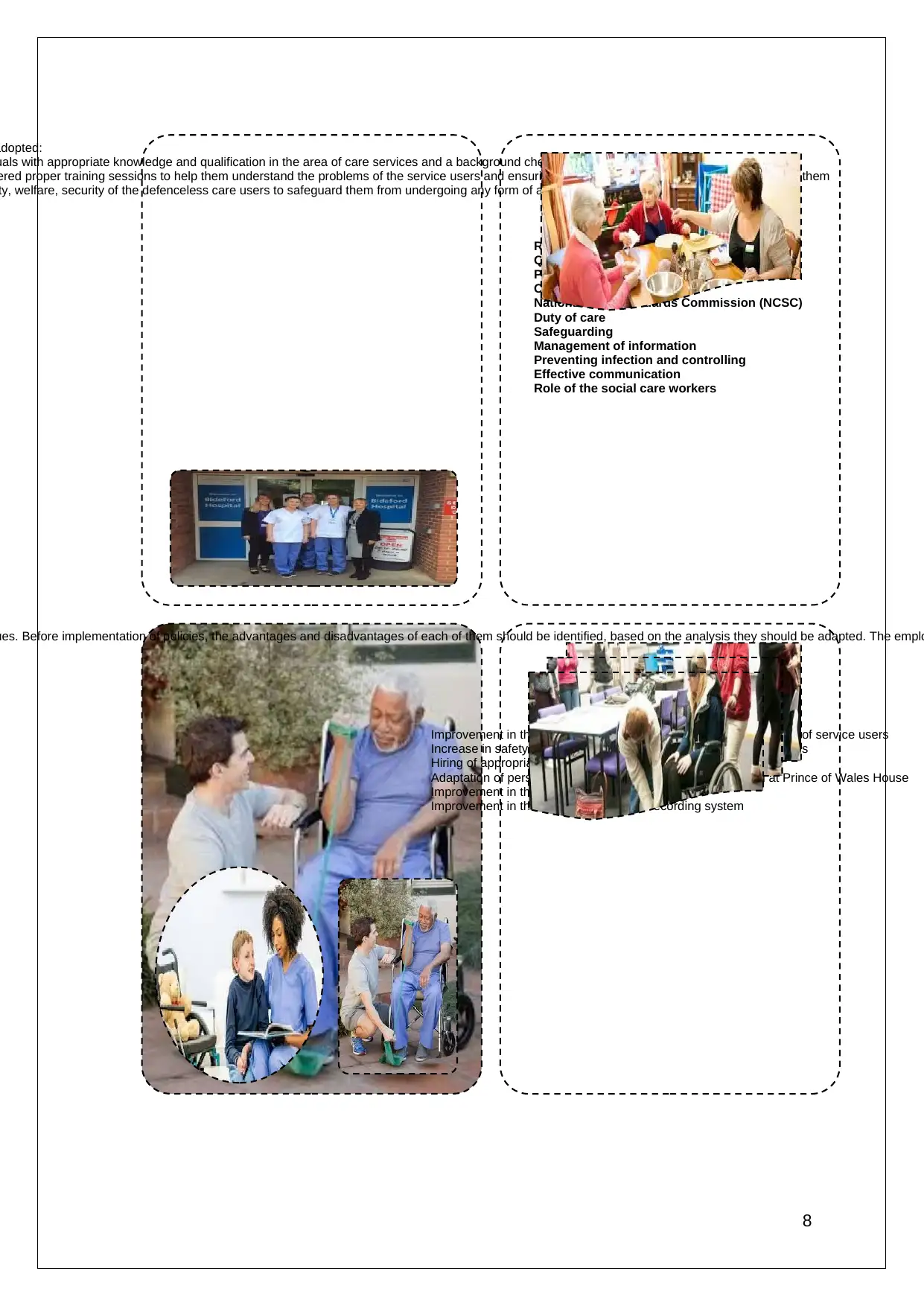
adopted:
uals with appropriate knowledge and qualification in the area of care services and a background check should be conducted
ered proper training sessions to help them understand the problems of the service users and ensuring that appropriate care service is delivered by them
ty, welfare, security of the defenceless care users to safeguard them from undergoing any form of abuse
Rights to Action
Quality Protects
Procurement
Care Standards Act 2000
National Care Standards Commission (NCSC)
Duty of care
Safeguarding
Management of information
Preventing infection and controlling
Effective communication
Role of the social care workers
ues. Before implementation of policies, the advantages and disadvantages of each of them should be identified, based on the analysis they should be adapted. The emplo
Improvement in the quality of services rendered to the adult groups of service users
Increase in safety and security of the care workers and service users
Hiring of appropriate care workers
Adaptation of person-centred approach, like the one followed at Prince of Wales House
Improvement in the level of cleanliness
Improvement in the documentation and recording system
8
uals with appropriate knowledge and qualification in the area of care services and a background check should be conducted
ered proper training sessions to help them understand the problems of the service users and ensuring that appropriate care service is delivered by them
ty, welfare, security of the defenceless care users to safeguard them from undergoing any form of abuse
Rights to Action
Quality Protects
Procurement
Care Standards Act 2000
National Care Standards Commission (NCSC)
Duty of care
Safeguarding
Management of information
Preventing infection and controlling
Effective communication
Role of the social care workers
ues. Before implementation of policies, the advantages and disadvantages of each of them should be identified, based on the analysis they should be adapted. The emplo
Improvement in the quality of services rendered to the adult groups of service users
Increase in safety and security of the care workers and service users
Hiring of appropriate care workers
Adaptation of person-centred approach, like the one followed at Prince of Wales House
Improvement in the level of cleanliness
Improvement in the documentation and recording system
8
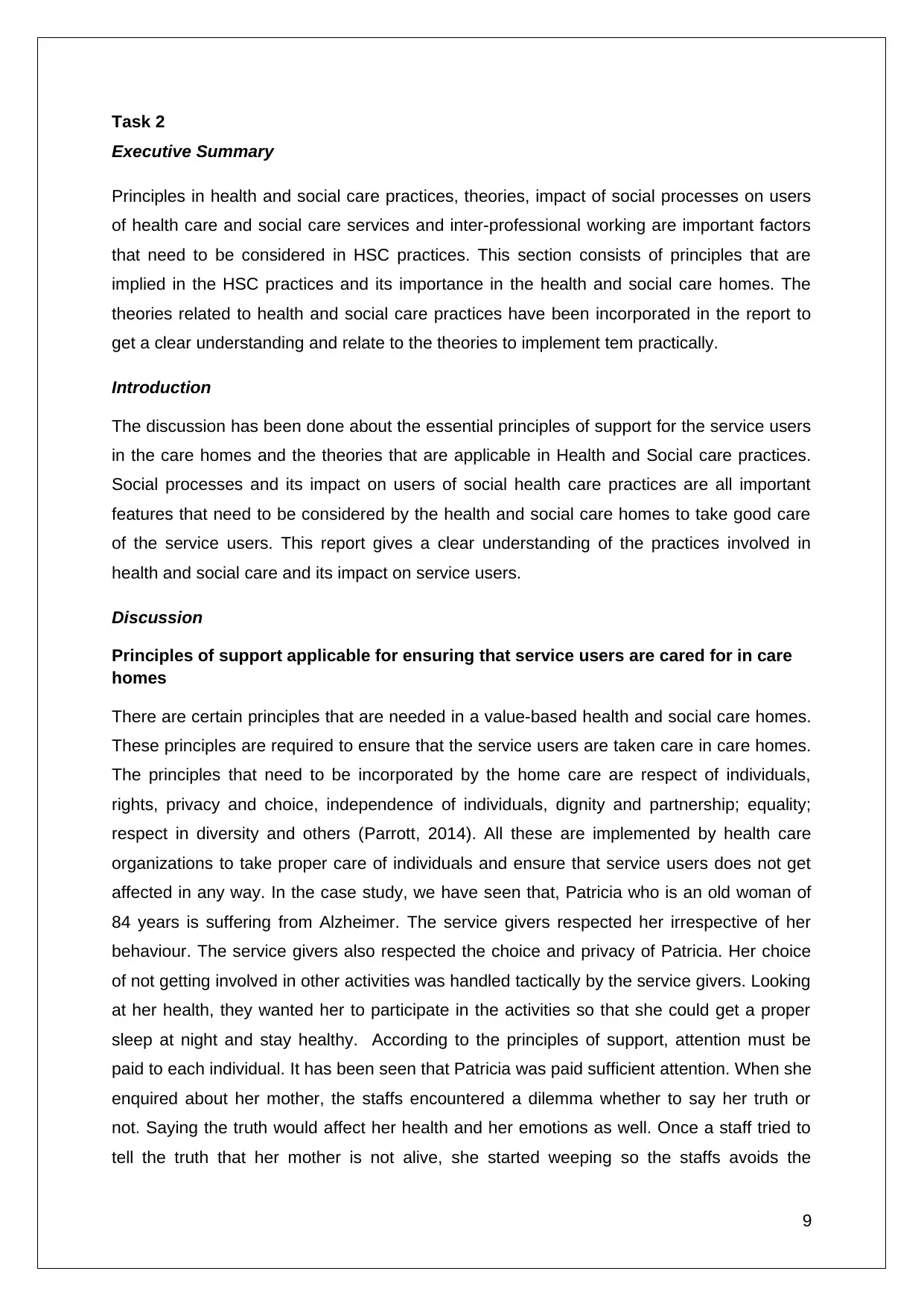
Task 2
Executive Summary
Principles in health and social care practices, theories, impact of social processes on users
of health care and social care services and inter-professional working are important factors
that need to be considered in HSC practices. This section consists of principles that are
implied in the HSC practices and its importance in the health and social care homes. The
theories related to health and social care practices have been incorporated in the report to
get a clear understanding and relate to the theories to implement tem practically.
Introduction
The discussion has been done about the essential principles of support for the service users
in the care homes and the theories that are applicable in Health and Social care practices.
Social processes and its impact on users of social health care practices are all important
features that need to be considered by the health and social care homes to take good care
of the service users. This report gives a clear understanding of the practices involved in
health and social care and its impact on service users.
Discussion
Principles of support applicable for ensuring that service users are cared for in care
homes
There are certain principles that are needed in a value-based health and social care homes.
These principles are required to ensure that the service users are taken care in care homes.
The principles that need to be incorporated by the home care are respect of individuals,
rights, privacy and choice, independence of individuals, dignity and partnership; equality;
respect in diversity and others (Parrott, 2014). All these are implemented by health care
organizations to take proper care of individuals and ensure that service users does not get
affected in any way. In the case study, we have seen that, Patricia who is an old woman of
84 years is suffering from Alzheimer. The service givers respected her irrespective of her
behaviour. The service givers also respected the choice and privacy of Patricia. Her choice
of not getting involved in other activities was handled tactically by the service givers. Looking
at her health, they wanted her to participate in the activities so that she could get a proper
sleep at night and stay healthy. According to the principles of support, attention must be
paid to each individual. It has been seen that Patricia was paid sufficient attention. When she
enquired about her mother, the staffs encountered a dilemma whether to say her truth or
not. Saying the truth would affect her health and her emotions as well. Once a staff tried to
tell the truth that her mother is not alive, she started weeping so the staffs avoids the
9
Executive Summary
Principles in health and social care practices, theories, impact of social processes on users
of health care and social care services and inter-professional working are important factors
that need to be considered in HSC practices. This section consists of principles that are
implied in the HSC practices and its importance in the health and social care homes. The
theories related to health and social care practices have been incorporated in the report to
get a clear understanding and relate to the theories to implement tem practically.
Introduction
The discussion has been done about the essential principles of support for the service users
in the care homes and the theories that are applicable in Health and Social care practices.
Social processes and its impact on users of social health care practices are all important
features that need to be considered by the health and social care homes to take good care
of the service users. This report gives a clear understanding of the practices involved in
health and social care and its impact on service users.
Discussion
Principles of support applicable for ensuring that service users are cared for in care
homes
There are certain principles that are needed in a value-based health and social care homes.
These principles are required to ensure that the service users are taken care in care homes.
The principles that need to be incorporated by the home care are respect of individuals,
rights, privacy and choice, independence of individuals, dignity and partnership; equality;
respect in diversity and others (Parrott, 2014). All these are implemented by health care
organizations to take proper care of individuals and ensure that service users does not get
affected in any way. In the case study, we have seen that, Patricia who is an old woman of
84 years is suffering from Alzheimer. The service givers respected her irrespective of her
behaviour. The service givers also respected the choice and privacy of Patricia. Her choice
of not getting involved in other activities was handled tactically by the service givers. Looking
at her health, they wanted her to participate in the activities so that she could get a proper
sleep at night and stay healthy. According to the principles of support, attention must be
paid to each individual. It has been seen that Patricia was paid sufficient attention. When she
enquired about her mother, the staffs encountered a dilemma whether to say her truth or
not. Saying the truth would affect her health and her emotions as well. Once a staff tried to
tell the truth that her mother is not alive, she started weeping so the staffs avoids the
9
⊘ This is a preview!⊘
Do you want full access?
Subscribe today to unlock all pages.

Trusted by 1+ million students worldwide
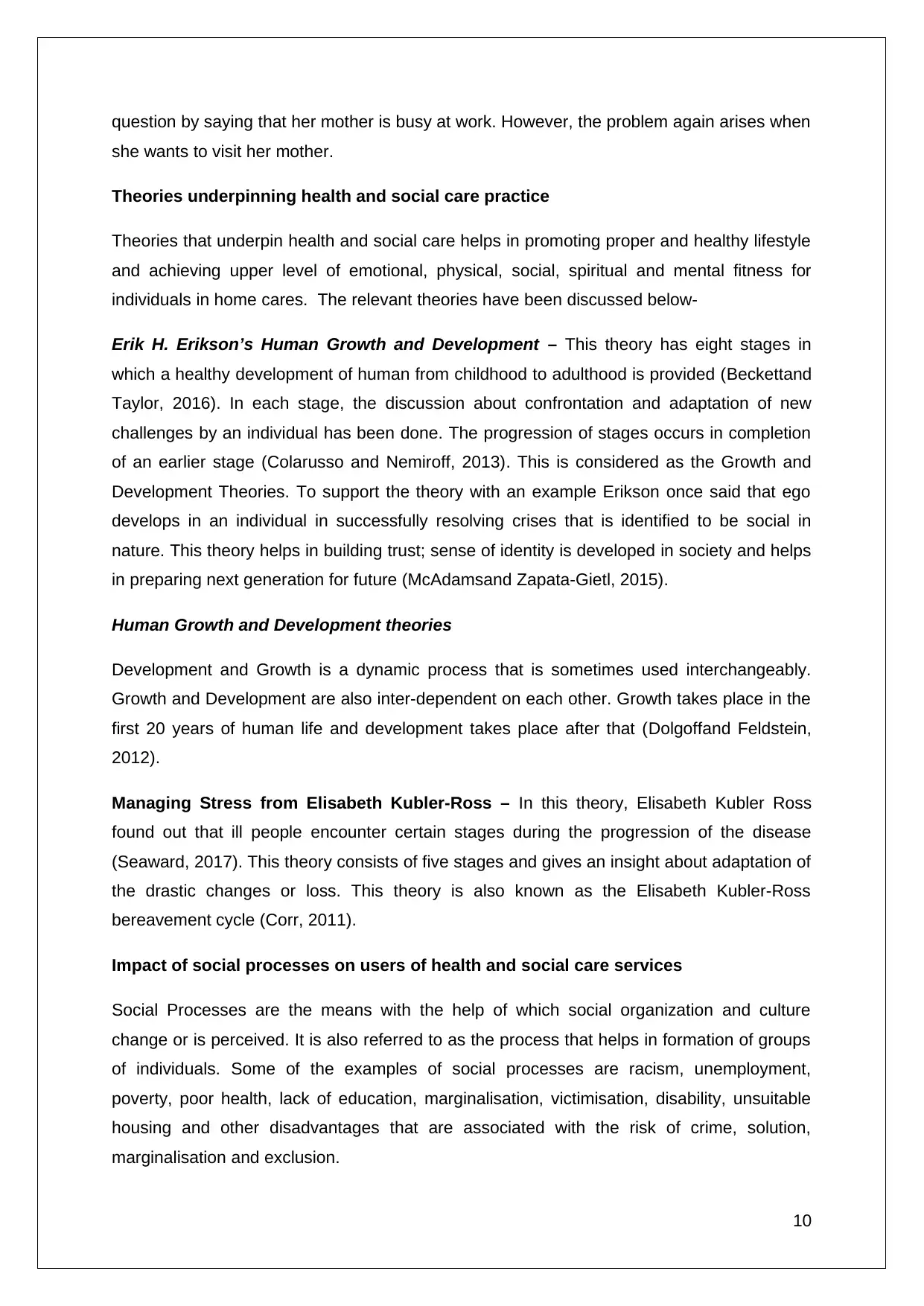
question by saying that her mother is busy at work. However, the problem again arises when
she wants to visit her mother.
Theories underpinning health and social care practice
Theories that underpin health and social care helps in promoting proper and healthy lifestyle
and achieving upper level of emotional, physical, social, spiritual and mental fitness for
individuals in home cares. The relevant theories have been discussed below-
Erik H. Erikson’s Human Growth and Development – This theory has eight stages in
which a healthy development of human from childhood to adulthood is provided (Beckettand
Taylor, 2016). In each stage, the discussion about confrontation and adaptation of new
challenges by an individual has been done. The progression of stages occurs in completion
of an earlier stage (Colarusso and Nemiroff, 2013). This is considered as the Growth and
Development Theories. To support the theory with an example Erikson once said that ego
develops in an individual in successfully resolving crises that is identified to be social in
nature. This theory helps in building trust; sense of identity is developed in society and helps
in preparing next generation for future (McAdamsand Zapata-Gietl, 2015).
Human Growth and Development theories
Development and Growth is a dynamic process that is sometimes used interchangeably.
Growth and Development are also inter-dependent on each other. Growth takes place in the
first 20 years of human life and development takes place after that (Dolgoffand Feldstein,
2012).
Managing Stress from Elisabeth Kubler-Ross – In this theory, Elisabeth Kubler Ross
found out that ill people encounter certain stages during the progression of the disease
(Seaward, 2017). This theory consists of five stages and gives an insight about adaptation of
the drastic changes or loss. This theory is also known as the Elisabeth Kubler-Ross
bereavement cycle (Corr, 2011).
Impact of social processes on users of health and social care services
Social Processes are the means with the help of which social organization and culture
change or is perceived. It is also referred to as the process that helps in formation of groups
of individuals. Some of the examples of social processes are racism, unemployment,
poverty, poor health, lack of education, marginalisation, victimisation, disability, unsuitable
housing and other disadvantages that are associated with the risk of crime, solution,
marginalisation and exclusion.
10
she wants to visit her mother.
Theories underpinning health and social care practice
Theories that underpin health and social care helps in promoting proper and healthy lifestyle
and achieving upper level of emotional, physical, social, spiritual and mental fitness for
individuals in home cares. The relevant theories have been discussed below-
Erik H. Erikson’s Human Growth and Development – This theory has eight stages in
which a healthy development of human from childhood to adulthood is provided (Beckettand
Taylor, 2016). In each stage, the discussion about confrontation and adaptation of new
challenges by an individual has been done. The progression of stages occurs in completion
of an earlier stage (Colarusso and Nemiroff, 2013). This is considered as the Growth and
Development Theories. To support the theory with an example Erikson once said that ego
develops in an individual in successfully resolving crises that is identified to be social in
nature. This theory helps in building trust; sense of identity is developed in society and helps
in preparing next generation for future (McAdamsand Zapata-Gietl, 2015).
Human Growth and Development theories
Development and Growth is a dynamic process that is sometimes used interchangeably.
Growth and Development are also inter-dependent on each other. Growth takes place in the
first 20 years of human life and development takes place after that (Dolgoffand Feldstein,
2012).
Managing Stress from Elisabeth Kubler-Ross – In this theory, Elisabeth Kubler Ross
found out that ill people encounter certain stages during the progression of the disease
(Seaward, 2017). This theory consists of five stages and gives an insight about adaptation of
the drastic changes or loss. This theory is also known as the Elisabeth Kubler-Ross
bereavement cycle (Corr, 2011).
Impact of social processes on users of health and social care services
Social Processes are the means with the help of which social organization and culture
change or is perceived. It is also referred to as the process that helps in formation of groups
of individuals. Some of the examples of social processes are racism, unemployment,
poverty, poor health, lack of education, marginalisation, victimisation, disability, unsuitable
housing and other disadvantages that are associated with the risk of crime, solution,
marginalisation and exclusion.
10
Paraphrase This Document
Need a fresh take? Get an instant paraphrase of this document with our AI Paraphraser
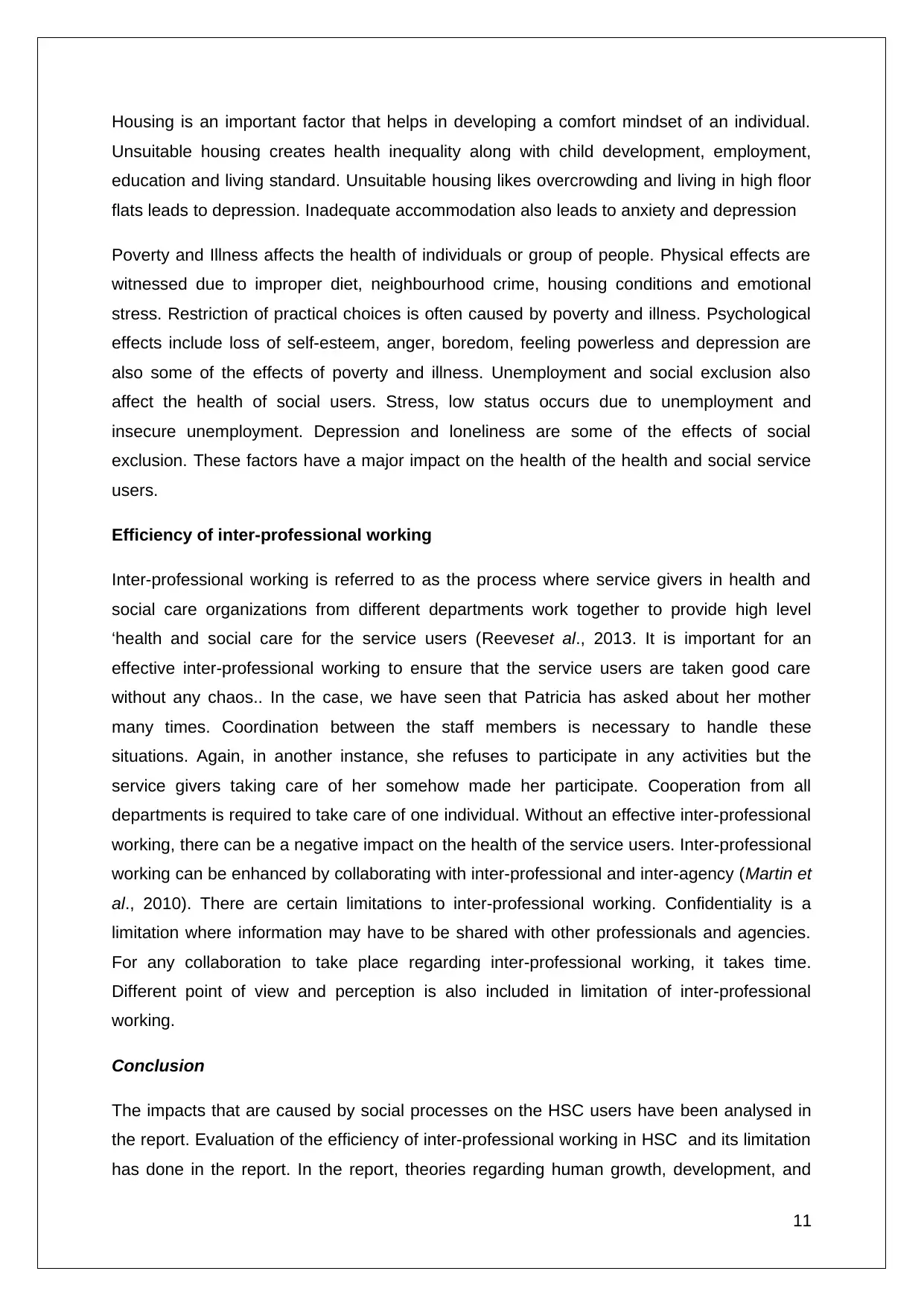
Housing is an important factor that helps in developing a comfort mindset of an individual.
Unsuitable housing creates health inequality along with child development, employment,
education and living standard. Unsuitable housing likes overcrowding and living in high floor
flats leads to depression. Inadequate accommodation also leads to anxiety and depression
Poverty and Illness affects the health of individuals or group of people. Physical effects are
witnessed due to improper diet, neighbourhood crime, housing conditions and emotional
stress. Restriction of practical choices is often caused by poverty and illness. Psychological
effects include loss of self-esteem, anger, boredom, feeling powerless and depression are
also some of the effects of poverty and illness. Unemployment and social exclusion also
affect the health of social users. Stress, low status occurs due to unemployment and
insecure unemployment. Depression and loneliness are some of the effects of social
exclusion. These factors have a major impact on the health of the health and social service
users.
Efficiency of inter-professional working
Inter-professional working is referred to as the process where service givers in health and
social care organizations from different departments work together to provide high level
‘health and social care for the service users (Reeveset al., 2013. It is important for an
effective inter-professional working to ensure that the service users are taken good care
without any chaos.. In the case, we have seen that Patricia has asked about her mother
many times. Coordination between the staff members is necessary to handle these
situations. Again, in another instance, she refuses to participate in any activities but the
service givers taking care of her somehow made her participate. Cooperation from all
departments is required to take care of one individual. Without an effective inter-professional
working, there can be a negative impact on the health of the service users. Inter-professional
working can be enhanced by collaborating with inter-professional and inter-agency (Martin et
al., 2010). There are certain limitations to inter-professional working. Confidentiality is a
limitation where information may have to be shared with other professionals and agencies.
For any collaboration to take place regarding inter-professional working, it takes time.
Different point of view and perception is also included in limitation of inter-professional
working.
Conclusion
The impacts that are caused by social processes on the HSC users have been analysed in
the report. Evaluation of the efficiency of inter-professional working in HSC and its limitation
has done in the report. In the report, theories regarding human growth, development, and
11
Unsuitable housing creates health inequality along with child development, employment,
education and living standard. Unsuitable housing likes overcrowding and living in high floor
flats leads to depression. Inadequate accommodation also leads to anxiety and depression
Poverty and Illness affects the health of individuals or group of people. Physical effects are
witnessed due to improper diet, neighbourhood crime, housing conditions and emotional
stress. Restriction of practical choices is often caused by poverty and illness. Psychological
effects include loss of self-esteem, anger, boredom, feeling powerless and depression are
also some of the effects of poverty and illness. Unemployment and social exclusion also
affect the health of social users. Stress, low status occurs due to unemployment and
insecure unemployment. Depression and loneliness are some of the effects of social
exclusion. These factors have a major impact on the health of the health and social service
users.
Efficiency of inter-professional working
Inter-professional working is referred to as the process where service givers in health and
social care organizations from different departments work together to provide high level
‘health and social care for the service users (Reeveset al., 2013. It is important for an
effective inter-professional working to ensure that the service users are taken good care
without any chaos.. In the case, we have seen that Patricia has asked about her mother
many times. Coordination between the staff members is necessary to handle these
situations. Again, in another instance, she refuses to participate in any activities but the
service givers taking care of her somehow made her participate. Cooperation from all
departments is required to take care of one individual. Without an effective inter-professional
working, there can be a negative impact on the health of the service users. Inter-professional
working can be enhanced by collaborating with inter-professional and inter-agency (Martin et
al., 2010). There are certain limitations to inter-professional working. Confidentiality is a
limitation where information may have to be shared with other professionals and agencies.
For any collaboration to take place regarding inter-professional working, it takes time.
Different point of view and perception is also included in limitation of inter-professional
working.
Conclusion
The impacts that are caused by social processes on the HSC users have been analysed in
the report. Evaluation of the efficiency of inter-professional working in HSC and its limitation
has done in the report. In the report, theories regarding human growth, development, and
11
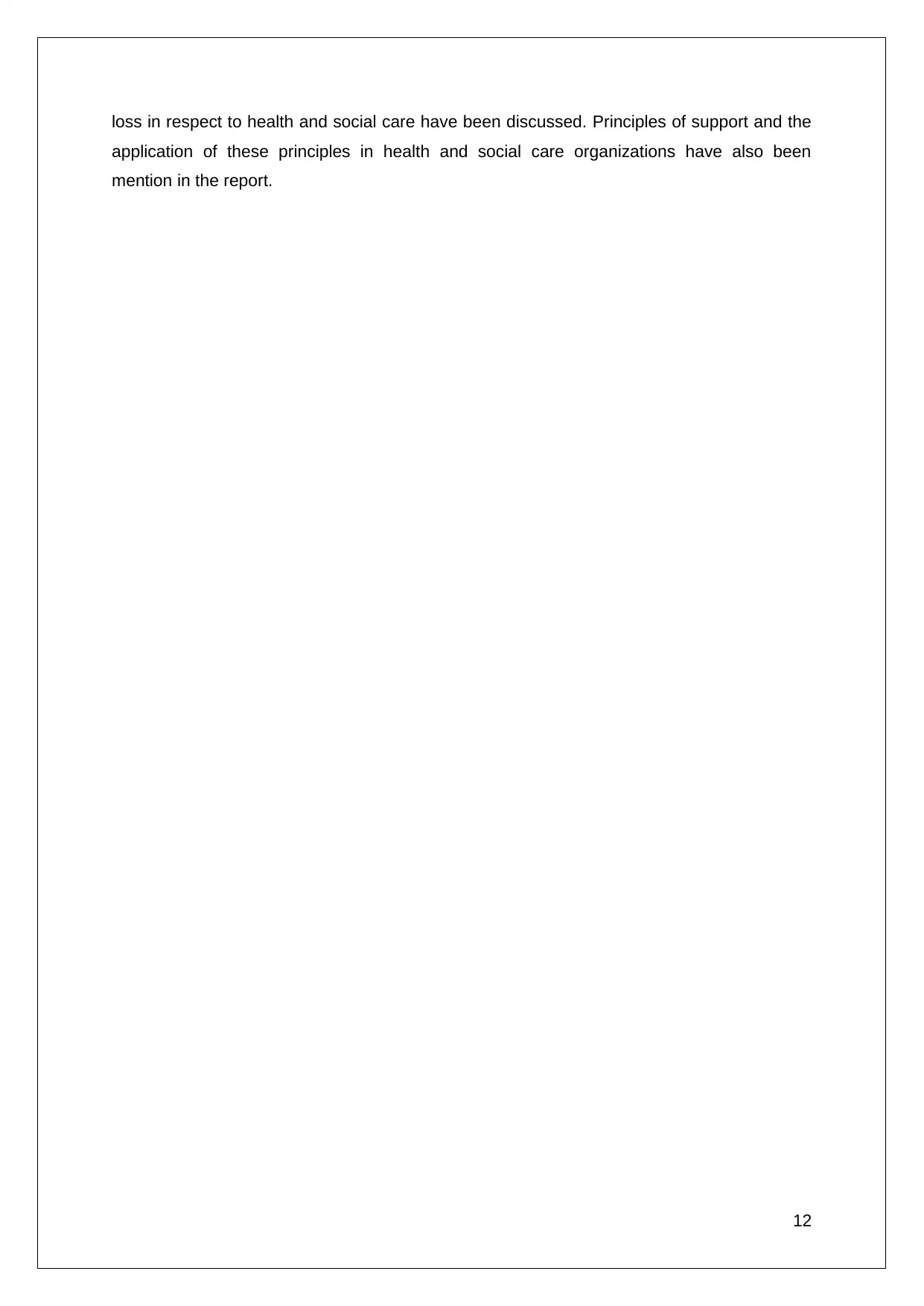
loss in respect to health and social care have been discussed. Principles of support and the
application of these principles in health and social care organizations have also been
mention in the report.
12
application of these principles in health and social care organizations have also been
mention in the report.
12
⊘ This is a preview!⊘
Do you want full access?
Subscribe today to unlock all pages.

Trusted by 1+ million students worldwide
1 out of 19
Related Documents
Your All-in-One AI-Powered Toolkit for Academic Success.
+13062052269
info@desklib.com
Available 24*7 on WhatsApp / Email
![[object Object]](/_next/static/media/star-bottom.7253800d.svg)
Unlock your academic potential
Copyright © 2020–2026 A2Z Services. All Rights Reserved. Developed and managed by ZUCOL.





